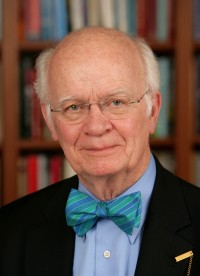Who do you want to be? Ready for new adventures: Ready for new adventures
Here is some Christmas– New Year nostalgia with, I hope, a point. Scene One: A Christmas Eve in 1934 or 1935, a drought, dust-bowl, Depression year in Nebraska. Lutheran parochial schoolchildren are presenting the Christmas Eve service to a jammed congregation. This service was a cosmic event at our house, since father was an organist-choirmaster-teacher who brought to his work piety, perfectionism and contagious enthusiasm.
Though the children’s thoughts were supposed to be only on the manger, mine wandered. As others marched forward to sing, speak or act, I found myself comparing our family’s Christmas with that of others—not out of envy or pride, but out of curiosity. My mind stopped at each child in the rows: would any of them have a better Christmas than we did at our house? I knew that some would have more presents under the tree. But would I trade our tree, our living room, our presents, our songs and family rituals for any of theirs? If other idle minds were similarly distracted, I hope that each was thinking about his or her circumstance as I was about ours.
Offer me Christmas at Buckingham Palace or J. P. Morgan’s mansion or the Taj Mahal or Macy’s, and I would have chosen to celebrate at home. The lesson I learned then was that whatever our external circumstances, most of us would rather be ourselves taking on our own lives than be transported into someone else’s consciousness, role, place and circumstances.
Scene Two: our house on New Year’s Eves of old, or yours if you want to play the game. The game is that each person has to say who, among the living, she or he would rather be than herself or himself. The stricture: you cannot be yourself. You have to be someone else. And remember, you don’t get only the brains and beauty, the talent and treasure, of that chosen other. You have to take on the downside, the heartaches, the gene pool, the stock of past experiences, and the future prospects of that person.
Try it. We used to, until my spouse forbade it. Why? People think for a while. Most toss off a frivolous choice or two, only to hear from others of troubles and traumas in the life and career of that person. Why does that give them pause? Don’t each of us have troubles and traumas of our own? Yes, but they are our own. We learn our limits and how to test them or live with them. So whoever is “it” reconsiders, probes and scans and tries to think of someone he’d rather be, troubles, traumas and all. The typical end of the round and, soon, of the game is that people declare, “I don’t want to play this game. I’m frustrated. I can’t think of anyone. I want to be me.”
People react this way whether their self-esteem is high or low. They react this way whether they are proud or humble. At the end of the game we can say to ourselves and to each other, “Look, friend, you’ve had the choice of 6 billion people and you end up with yourself. Don’t ever whine or kvetch around me again. Enjoy being you.”
By the way, if you let people choose not just among the living but also among those long dead, they are more than ready to come up with names. It’s easier to choose when we know the ends and outcomes of lives.
But as we face each new year, knowing that there will be tears and dire prognoses ahead for many, and that pains mix with joys and downs with ups, most of us are ready for the challenge. I suppose, in believers’ cases, we could call our attitude “godliness with contentment,” mixed with “sacred restlessness” and a readiness for new adventures.





